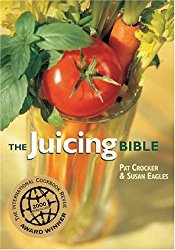
For years nutritionists and health practitioners have urged North Americans to eat more fruits and vegetables. Why? Because these foods are low in fat, and are important sources of essential vitamins, minerals and fiber. Yet many of us -- even the most health conscious -- still don't consume the recommended 5 to 10 servings a day. So what's the solution? For some people, the answer lies in vitamin and herbal supplements, both of which have enjoyed explosive sales growth over the past decade. But recent research suggests that whole, natural foods are still the best source of nutrients. And there's no easier or more effective way to add fresh fruits and vegetables to your diet than by juicing them. Now, with The Juicing Bible, there's a new and comprehensive source of information for anyone who wants to explore the health benefits of juicing. Here you'll find a fully illustrated reference documenting the nutritive values and healing properties of over 100 fruits, vegetables and herbs. There's also a special section that addresses 60 common health conditions -- with prescriptive advice for using specific juices, as well as beneficial dietary and lifestyle changes. And, of course, there are the juicing recipes themselves -- over 150 of them, including flavorful juices (sample a Crimson Cleanser or Beta Blast), smoothies (try the Pump It Up or Cool Down), tonics, bitters, coffee substitutes and healing teas. With helpful sidebars, health tips and preparation techniques throughout, The Juicing Bible is jam-packed with information. It's a BIG book -- the biggest we've ever published -- and it's an essential guide for anyone who wants to explore all the nutritional benefits that natural foods can provide. Why Juice? Research has shown that freshly juiced fruits and vegetables contain literally thousands of natural chemicals that simply aren't provided by nutritional or vitamin supplements. These substances, called phytochemicals, are only now being understood; but a number of studies suggest that they play an essential role in ridding the body of potential carcinogens, as well as protecting against cellular damage. Fresh juice (unlike commercially prepared juice) contains a number of enzymes, which are essential to the proper function of the human metabolism Juicing removes much of the indigestible fiber in fruits and vegetables, which means that a substantially larger amount of available nutrients can be absorbed by the body. One study has shown that a carrot, when juiced, delivers 100 times the beta-carotene of a carrot eaten whole.